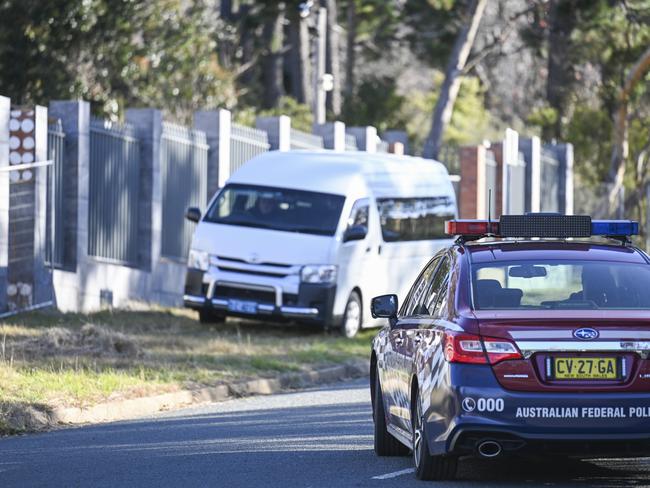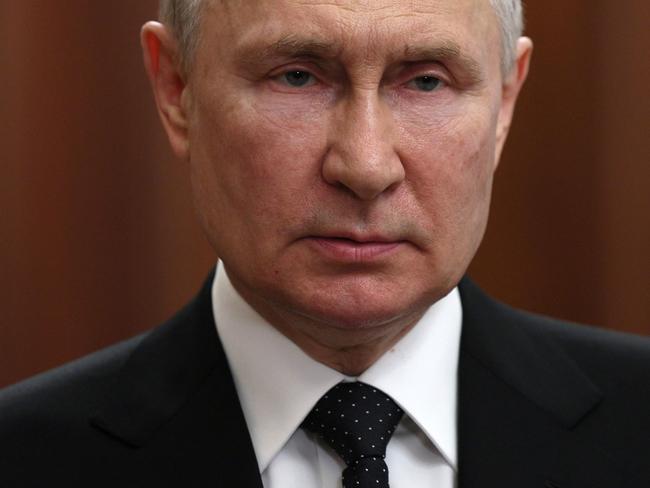Huge blow in High Court embassy fight as Russia loses bid to keep government away from contested site
A High Court challenge over Russia’s embassy site, which has been the subject of a diplomatic standoff in Australia, has taken a drastic turn.
Breaking News
Don't miss out on the headlines from Breaking News. Followed categories will be added to My News.
The Russian Federation has failed in its bid to keep the Australian government away from the contested site Vladimir Putin’s regime had planned to build its new embassy on.
Russia wanted to maintain control of the Canberra site while it mounted a case in the High Court of Australia to challenge legislation rammed through the parliament earlier this month.
The changes to the Home Affairs Act tore up Russia’s lease for the Yarralumla block on which it had planned to build a diplomatic complex, with the government citing national security concerns.
The High Court on Monday dismissed an injunction filed by Russian ambassador Alexey Pavlovsky seeking to stop the government from entering or re-leasing the parcel of land pending the outcome of the more substantive legal challenge, which is expected to be heard at a later date.
Describing the Kremlin’s challenge to the laws as “weak”, High Court Justice Jayne Jagot turfed out its application to retain temporary possession of the site immediately after listening to arguments from Russia and the Commonwealth during a two-hour hearing.

Russia’s barrister Elliot Hyde failed to convince Justice Jagot the Kremlin’s case against the laws was compelling enough to justify preventing the Australian government from taking possession of the land.
But Justice Jagot said Russia hadn’t provided any meaningful evidence as to why the building would have to be destroyed, and pointed out that this argument hinged on the Kremlin winning its more substantive court challenge and having its lease reinstated.
Mr Hyde argued Russia had been allowed to maintain control of the site last year while it challenged in the Federal Court an earlier eviction notice the National Capital Authority handed it in August 2022.
The Federal Court found in Russia’s favour, prompting the Albanese government to enact the new laws earlier this month to permanently prevent the new embassy from being built.
Justice Jagot on Monday told the circumstances in which Russia was contesting the parcel of land were now “radically” different because of the changes to the Home Affairs Act.
The government used the legislation to crush the Kremlin’s new embassy plans over concerns the Yarralumla site’s proximity to Parliament House posed a spying risk, with Russia’s existing embassy in the Canberra suburb of Griffith unaffected by the change.
Russia has argued the legislation is invalid because it isn’t “supported by a head of power” and claims the Commonwealth didn’t give given just terms for the acquisition of the property the Kremlin had leased as required under the Constitution.
The squatter calling the cancelled Russian Embassy site in Canberra home has now left the building (site).
— Jenna Clarke (@jennamclarke) June 26, 2023
More on @australianpic.twitter.com/ku5hjyRME6
Mr Hyde argued the government was not justified to say Russia’s occupation of the site posed a security risk, referencing Anthony Albanese’s recent statement that “a bloke standing in the cold on a bit of grass in Canberra is not a threat”.
The Prime Minister made those remarks after an unknown Russian representative – described in court on Monday as a “security guard” – was discovered last week squatting on the Yarralumla block in defiance of the new legislation.
Mr Albanese welcomed the High Court’s decision, saying the court had made clear there was no legal basis for a Russian presence to continue on the site at this time.
“We expect the Russian Federation to act in accordance with the court’s ruling,” he told reporters.
The Russian squatter was then filmed leaving the block, ending a multi-day stand-off in which he had been living in a small shed on the fenced-off site while enjoying diplomatic immunity.
The man wouldn’t say anything to reporters who peppered him with questions as he got into a silver car with diplomatic plates believed to have been driven by an associate.
A diplomatic van was then stationed outside the gates at the site with a different man sitting inside, who also refused to answer questions from the media.


The Commonwealth’s barrister Tim Begbie KC sought to paint Russia’s arguments against the laws as weak at Monday’s High Court hearing.
“It’s not just that they haven’t made a compelling case for constitutional validity, they’ve made absolutely no case,” he told the court.
Mr Begbie told the court he had written to Russia’s lawyers on Saturday to tell them the Australian government wouldn’t re-lease the site while the case was underway.
He said he hadn’t received a reply but suggested this was understandable given “Russia has had other things on its mind over the weekend”, in an apparent reference to the attempted mutiny of the Wagner mercenary group.
Mr Hyde told the court his instructing solicitor hadn’t received the letter until late on Saturday evening and suggested he hadn’t had time to respond.
He said he would seek further instructions from Russia in relation to whether it would contest Monday’s decision as well as in relation to its more substantive High Court challenge against the laws that tore up its lease.
Court documents filed on Friday reveal Russia paid more than $2.75m in 2008 to be allowed to sign a 99-year lease for the parcel of land, with ongoing annual rental payments of just five cents.

But the embassy plans were dogged by issues from the start, with court documents showing Russia says it has spent more than $8.2m on developing the land with little success.
Fifteen-years after Russia signed the lease, only a consular building has been erected on the site and the remainder of the diplomatic complex, including the embassy itself, is yet to be built.
Moscow and Canberra’s diplomatic row is set against the backdrop of Russia’s ongoing war with Ukraine, now in its 17th month, which has sparked international condemnation of Vladimir Putin’s regime.
A short time after Monday’s High Court hearing ended, the Albanese government announced a new $110m assistance package for Ukraine to help the eastern European nation defend itself against what Australia views as “Russia’s illegal, immoral and unprovoked invasion” of its smaller neighbour.
Originally published as Huge blow in High Court embassy fight as Russia loses bid to keep government away from contested site


